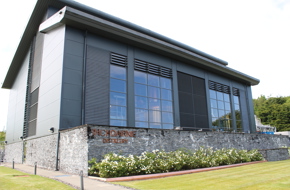Highlights
- Energy consumption is 4.24kw per litre of alcohol.
- Use 100% renewable electricity.
- Carried out feasibility study to look at the potential for making hydrogen at the distillery and using it as the distillery’s fuel source.
- Working with supply chain and wider agricultural community to achieve NetZero by 2040.

InchDairnie is a single malt scotch whisky distillery on the outskirts of Glenrothes, in Fife. Every aspect of the distillery has been designed around maximizing flavour, according to the seasons. The distillery only use barley which has been grown locally in Fife and employs two bespoke pieces of equipment, a Mash Filter and Lomond Still, both used for experimentation and innovation. InchDairnie are yet to launch their first brand; while they wait for their whisky to reach its optimum maturation, the distillery produce blends for their strategic partner, MacDuff International.
The distillery was built between 2014 and 2015, with distillation commencing in December 2015. In order to achieve an energy consumption of 4.24 kw per litre of alcohol, thought to be one of the lowest in the Scotch Whisky industry, the distillery have incorporated in their design a number of innovative processing techniques. A mash filter, as opposed to a lauter tun, and Thermal Vapour Recompression (TVR) on both stills. And this already low level of energy consumption was only the start of InchDairnie’s search for an even lower carbon footprint.
With the help of Scottish Enterprise, the distillery commissioned a carbon footprint calculation report. This identified the key areas where the carbon was being generated, malted barley and energy consumed by the distillery.
In 2019 the distillery changed its electricity supply contract to a 100% renewable supply. The distillery supplies its co-products, draff and pot ale, to a local Anaerobic Digestion (AD) Plant. The digestate from the AD plant is then spread on local farmland. Promoting a circular economy, InchDairnie altered their malting barley specification to allow for the use of barley grown on land where the digestate is spread.
In 2020 the distillery entered a competition run by The Department for Business, Energy and Industrial Strategy (BEIS). The competition was to select the best proposal for a feasibility study to look at the use of low carbon energy for the distilling sector. The distillery was successful, and it carried out a feasibility study looking at the potential for making hydrogen at the distillery and using it as the distillery’s fuel source.
InchDairnie are working with their supply chains and wider agricultural community to drive the industry to achieve its goal of NetZero by 2040. The distillery has recently become a sponsor of YEN Zero, which aims to create a net-zero community where key topics can be discussed, emission calculations and reports can be shared, and community strategies and initiatives can be applied, to help reduce carbon footprint. InchDairnie Distillery has decided to take this one step further and sponsor five local Fife farms in the YEN Zero program, for the next four years. The distillery will malt and distil some of their barley, to outline the full impact from field to cask. They will also give a cask of whisky, made from their own barley, to the farm which achieves the lowest carbon footprint.